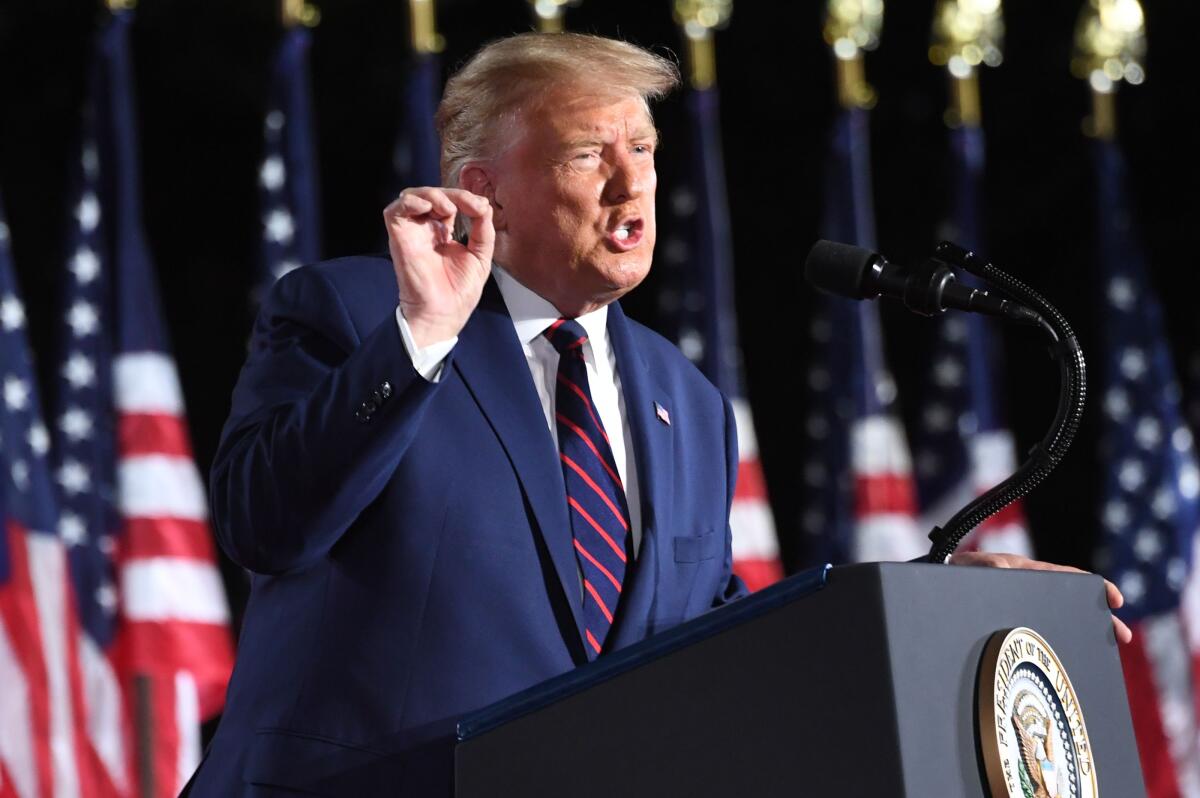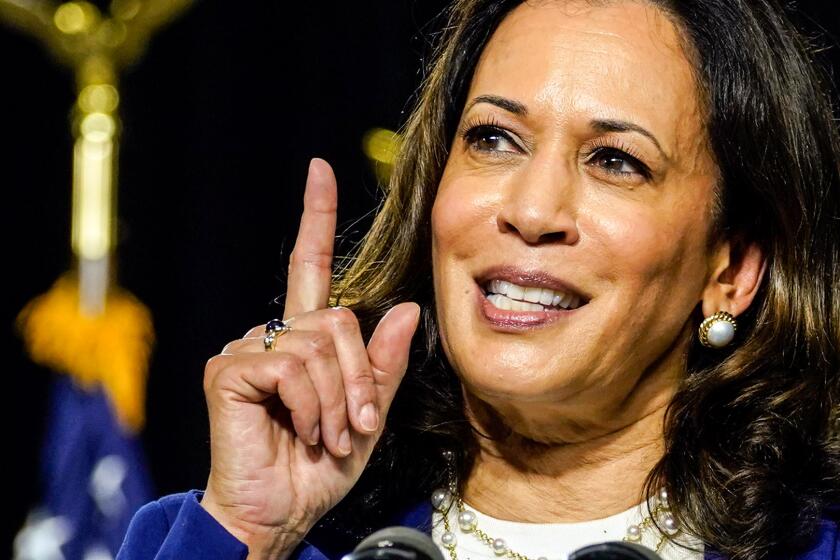Five takeaways from the final night of the RNC

- Share via
With a blaze of fireworks and a burst of heated rhetoric, President Trump closed out the Republican National Convention on Thursday night in characteristic fashion.
There was spectacle, an adoring (largely unmasked, socially undistanced) crowd and the chance for Trump to address, without filter, a national audience in the millions.
By delivering his acceptance speech from the South Lawn of the White House in violation of tradition and protocol — but with low energy by his usual standards — Trump once again outraged critics and delighted supporters by trampling assorted do’s and don’ts.
Here are five takeaways from the convention’s fourth and final night:
Trump on Trump
No one has been better selling Donald Trump than Donald Trump.
Faced with a daunting path to reelection, he used his convention-capping speech to wreathe his presidency in superlatives and paint his opponent, Democrat Joe Biden, as not exactly the personification of evil but something close to it.
“Joe Biden is not a savior of America’s soul,” Trump said. “He is the destroyer of America’s jobs and, if given the chance, he will be the destroyer of American greatness.”
He was extravagant, if vague, in his promises.
The COVID-19 pandemic that is killing more than a thousand people a day will be tamed by a vaccine produced by the end of the year, if not sooner, Trump vowed. The economy that reached depths summoning comparisons to the Great Recession will, he suggested, soon enough be the envy of the world.
If elected to a second term, he promised, there will be further tax cuts, more police, a crackdown on those who attack law enforcement officers, expanded energy development and “a new age of American ambition in space” that lands the first woman on the moon.
By contrast, Trump said, electing Biden and his running mate, California Sen. Kamala Harris, would lead to ruination: of industry and enterprise, of the country’s social and cultural fabrics, of America’s entire way of life.
“China would own our country if Joe Biden got elected,” Trump said, blaming the nation for spreading the novel coronavirus and vowing to hold its leaders “fully accountable for the tragedy,” though he didn’t say how.
The choice, Trump said, is stark, calling this “the most important election in the history of our country.”
“There has never been such a difference between the two parties,” Trump said, “or two individuals in ideology, philosophy or vision than there is right now.”
To some, that’s no hyperbole.
Trump vs. Trump
When First Lady Melania Trump delivered her White House address, she spoke with compassion for those who have suffered or lost loved ones because of the still-raging pandemic.
She acknowledged the historic and systemic racism that plagues America. She praised the open arms the country previously extended to immigrants such as herself. She did not use her “precious time” to attack Biden.
In short, much of what the first lady said Tuesday night was a striking contrast to her husband’s pugnacious address.
There was misdirection in her remarks, a through line in a convention that seemed focused less on the future than rewriting the past.
While she lamented the heated passions that divide the country, there was no recognition of her husband’s role stoking those flames. She portrayed the president, who is not exactly a workaholic, as wearing himself practically to the bone.
Still, it was a kinder, gentler — if somewhat contradictory — Trump and underscored how the ways of love and marriage are but a mystery.
On piety
In 1960, bidding to become the nation’s first Catholic president, Democrat John F. Kennedy had to convince voters he wasn’t overly beholden to his faith.
We’ve come a long way, though one might question whether it amounts to progress.
Several speakers this week attacked Biden, a devout Catholic, for being insufficiently devoted to his faith; retired football coach Lou Holtz even called the former vice president “a Catholic in name only.”
Evangelicals have been among the president’s strongest and most devoted backers. Never mind that the thrice-married Trump — who, among other sins, paid to hide a fling with an adult film actress — is arguably the least religiously grounded of recent presidents. One reason for the unwavering support is that Trump has consistently delivered on issues of great import to religious conservatives, among them abortion, a point hammered throughout the convention.
Repeated speakers hailed Trump and denounced Biden and Harris as the most radically “anti-life” ticket ever.
By contrast, “Trump is the most pro-life president in the country’s history,” Housing Secretary Ben Carson, a favorite of the Christian Right, said Thursday night. “He will continue to fight for those who cannot yet speak.”
This just in ...
The danger of a pre-packaged convention is the intrusion of real-time events.
The pandemic forced both parties to cancel their full-on, in-person gatherings, turning instead to a lineup of mostly recorded speeches and canned content. As a result, there were few opportunities for last-minute tinkering.
That left Republicans sounding a bit oblivious Wednesday night discussing law and order without once mentioning events exploding in Kenosha, Wis. It was only when Vice President Mike Pence delivered his acceptance speech, live, at the end of the program, that anyone alluded to the protests that followed the police shooting of Jacob Blake, a Black man hit multiple times in the back. Even then, Pence never uttered Blake’s name.
In a do-over of sorts, Carson — the sole Black member of Trump’s Cabinet — extended condolences Thursday night to the Blake family “and the other families who’ve been impacted by the tragic events in Kenosha.”
“As Jacob’s mother has urged the country,” Carson said, “let’s use our hearts, our love and our intelligence to work together to show the rest of the world how humans are supposed to treat each other. America is great when we behave greatly.”
The bottom line
Conventions are, above all, an exercise in promotion and puffery, with the intent of casting the best possible light on a party and its candidate for president. It’s where layered perspective goes to die.
Flaws are airbrushed. Inconsistencies are ignored. Contradiction has no place.
That said, this week’s Republican National Convention has been an epic undertaking in revisionist history.
In this alternative reality, the pandemic has virtually passed — thanks to the heroic efforts of Trump — the economy is roaring back, peace abides in the Middle East, and lions frolic with lambs in prosperous urban Opportunity Zones.
The whitewashing has left Democrats sputtering and fact-checkers weeping in despair.
But the punctilious can take heart: Very little of what transpired will matter much.
To take the most recent example, Trump had a perfectly lousy 2016 convention. His campaign manager, the now-imprisoned Paul Manafort, feuded with the home-state Republican governor, Ohio’s John Kasich, who boycotted the event. Melania Trump was caught plagiarizing her speech. Trump’s acceptance address was notable mostly for its anger and pungency.
Still, he was elected president.
Voters will cast their ballots in November based on their lived experience, on which candidate they like, trust — or, for some, dislike the least. Those factors, and events of the next 66 days, will carry far greater weight than anything done or said at either of this month’s two political conventions.
And with that, strike the tents for another four years.
Democratic vice presidential candidate Kamala Harris delivers an advance rebuttal to President Trump’s RNC speech.
More to Read
Get the L.A. Times Politics newsletter
Deeply reported insights into legislation, politics and policy from Sacramento, Washington and beyond. In your inbox twice per week.
You may occasionally receive promotional content from the Los Angeles Times.












